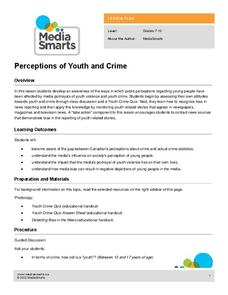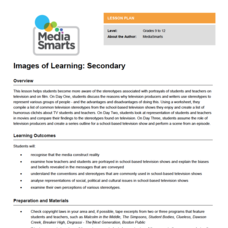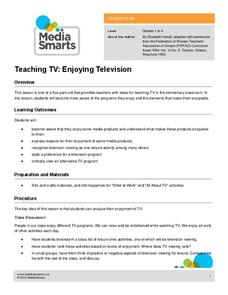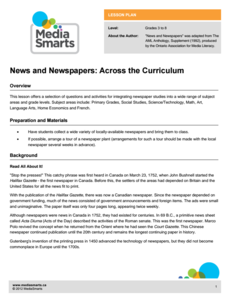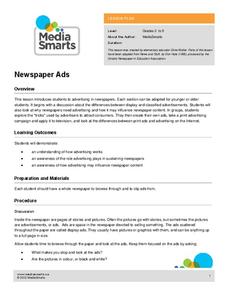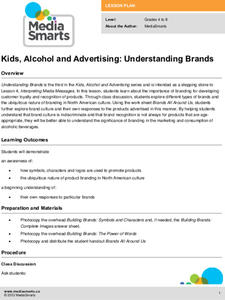Media Smarts
Authentication Beyond the Classroom
In an age of fake news, alternative facts, and Internet trolls it is essential that 21st Century learners develop the skills they need to authenticate the facts in viral news. Here is a great way to begin with a resource that provides...
Media Smarts
Selling Obesity
Learners examine health issues that are associated with our fast food culture, and the advertising of it. They begin with a snack-food survey to assess their own eating habits. Pupils are encouraged to think critically throughout the...
Media Smarts
Bias in News Sources
As young consumers of media, it is important for high schoolers to explore concepts of bias and prejudice, and how they may be present in media. After discussing ideological messages that media can contain, individuals complete a warm-up...
Media Smarts
Sex in Advertising
Converse with your class about the use of sex in advertising. Analyze the biological, emotional, and spiritual connections associated with sex, and how the media uses these affiliations to sell products. Take a closer look at...
Media Smarts
Perceptions of Youth and Crime
Explore the potential for bias in the news and in scholars' own attitudes and opinions. Begin with a quiz on youth crime to see how learners perceive crime among their peers. After looking at the correct answers, put individuals in...
Media Smarts
You Be the Editor
Look at different case studies to discuss the ethics of journalism. Twelve real-life events are written up and your learners get to be the editors. Encourage your class to think about the implications of publishing decisions. After each...
Media Smarts
Images of Learning: Secondary
Make your scholars more aware of stereotypical portrayals in film and television. Discuss the definition of "stereotypes" and how they are used to present a story. High schoolers look at specific television shows and complete a chart...
Media Smarts
Forensic Science Crimes Dramas
How do TV shows present criminology—is it realistic? High schoolers research crime dramas and participate in class discussion about topics such as who exists as the target audience and the values the shows communicate. They also research...
Media Smarts
Advertising All Around Us
Here is a set of advertising lessons, explore language, techniques, representation, and target audiences. Discuss the impact ads have on our daily lives. What do we see and how do they make us feel? Observe ads from around the world and...
Media Smarts
Teaching TV: Television Techniques
As part of a five-lesson plan unit on how television uses technology and film techniques to communicate meaning, elementary students create their own media productions that demonstrate their understanding of these concepts.
Media Smarts
Defining Popular Culture
What part does media play in creating, defining, and perpetuating popular culture? High schoolers chart their encounters with fads, trends, and icons and reflect on the media's influence on popular culture.
Media Smarts
Teaching TV: Enjoying Television
What makes a TV program enjoyable? As an introduction to media analysis, kids identify their favorite programs and the elements they find engaging.
Media Smarts
Teaching TV: Critically Evaluating TV
Mercer Mayer's There's a Nightmare in my Closet creates the framework for a specific discussion of nightmares generated by TV and a more general discussion of other emotions evoked by programs.
Media Smarts
Thinking About Television and Movies
As part of their study of the influence of TV and films, class members consider how music, lighting, costumes, camera angles, etc. are used to influence the response of viewers.
Media Smarts
Packaging Tricks
As part of their study of how advertisers use various techniques to influence consumers, kids examine the design, the promotions, and the product placement in the packaging of their favorite foods.
Media Smarts
News and Newspapers: Across the Curriculum
Did you know that the Chinese Court Gazette is the longest continuing news paper in history? In addition to some great background information, this resource includes suggestions for activities across grade levels and across the curriculum.
Media Smarts
Looking at Food Advertising
Tony The Tiger, The HoneyComb Kid, The Nestle Quick Bunny. As part of a study of the methods advertisers use to sell foods and how this advertising effects their food choices, kids create their own spokescharacter and/or jingle for one...
Media Smarts
Looking at Newspapers: Introduction
A scavenger hunt introduces class groups to the different sections of newspapers and the different types of articles found in each section.
Media Smarts
Newspaper Ads
Just how free is the press? After examining the advertising and propaganda techniques used by advertisers, class members consider the influence advertisers may exert over newspaper content.
Media Smarts
The Broadcast Project
As part of a unit on media studies, kids are asked to chart their viewing habits, observe the advertising that sponsors their favorite shows, and then to imagine what they would broadcast if given a block of airtime.
Media Smarts
Kids, Alcohol and Advertising: Young Drinkers
Learners explore reasons the alcohol industry needs replacement (new) drinkers and how it exploits the needs and desires of young people in order to foster brand loyalty.
Media Smarts
Who's on First? Alcohol Advertising and Sports
Middle schoolers examine how alcohol companies use sponsorship of sports to promote their products. They complete a survey, analyze the results, and research the sports sponsorship portfolios of five beer companies.
Media Smarts
Kids, Alcohol and Advertising - Understanding Brands
Learners explore the importance of branding for developing customer loyalty and recognition of products.
Media Smarts
Kids, Alcohol and Advertising - Messages about Drinking
Young scholars examine different groups in our society that deliver messages to the public about drinking and consider the influence of each of these groups on the attitudes and perceptions of young people.






